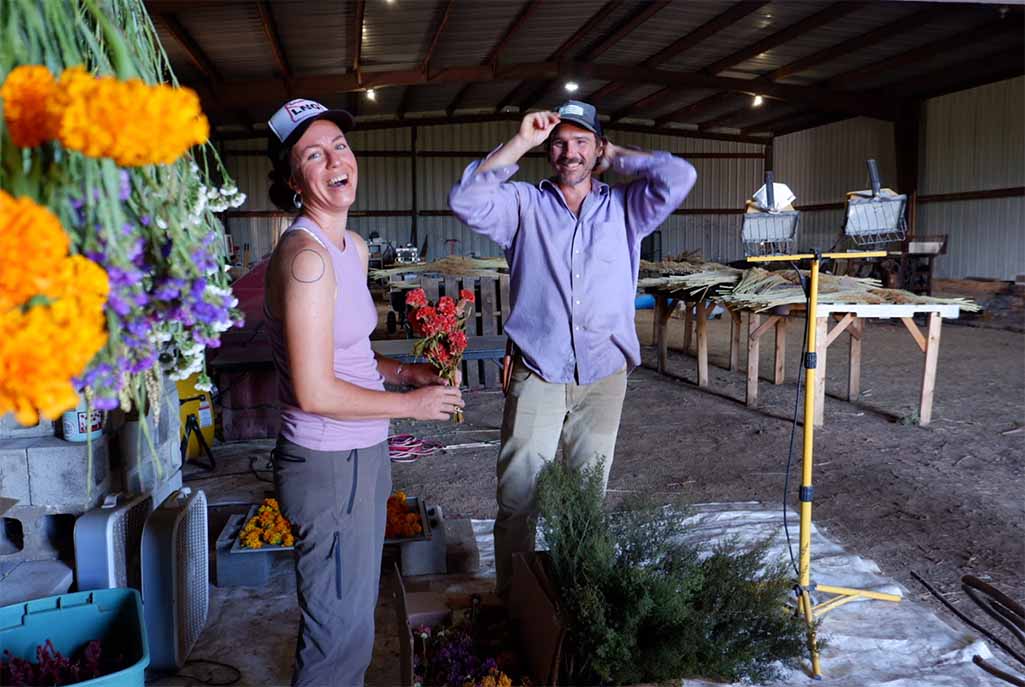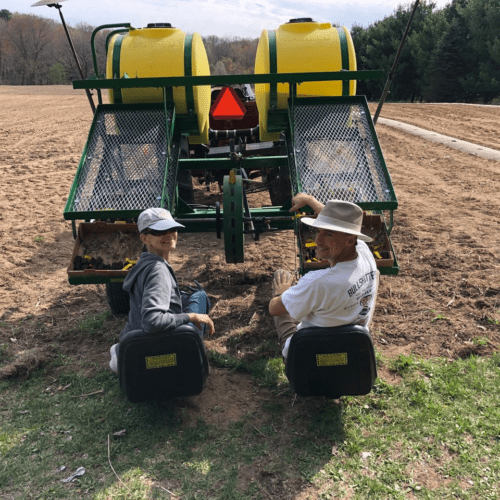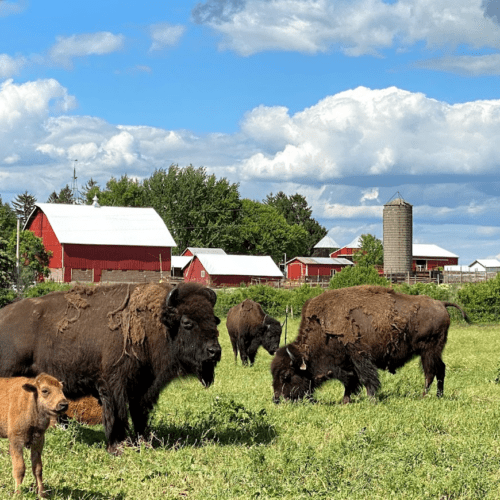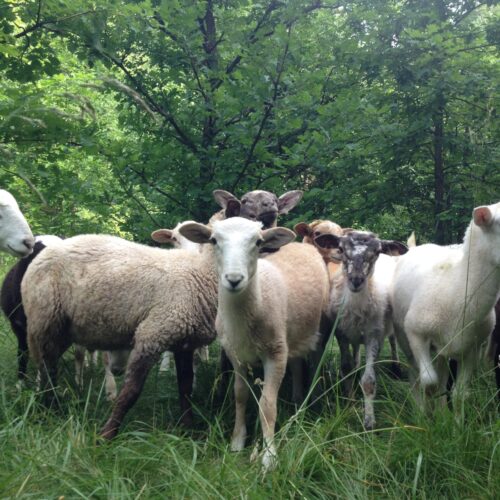
Bundle Sticks Farm
Lanesville, Indiana
Mentor Farm
Agroforestry Systems:
Alley Cropping
Forest Farming
Silvopasture
Wind Breaks
Farm Information
Bundle Sticks Farm produces craft-quality materials for basketry, broom-making, wreaths, and other crafts, while building biodiversity on the farm with native plants, organic practices, and agroforestry. Owners Brian and Elizabeth have over a decade of prior farming experience to launching Bundle Sticks Farm in 2022. Agroforestry on the farm consists of basketry willow (planted in 2023 and each winter since), a native-tree windbreak and elderberries planted 2023, alley cropping (pear, persimmon, pawpaw, hazelnut) and a living hedgerow (hawthorn, dogwoods, roses) planted in spring 2025, and silvopasture with chestnuts in the land (planting in 2026).
The farm is home to two humans, 10 (soon to be 20+) sheep, and 3 cats. The flock of Shetland sheep are moved every 2-4 days in a rotational grazing system. There is a small native plant and tree nursery started in 2024. The farm hosts public events, workdays and workshops (wreath-making, broom-making, etc) and the owners are developing infrastructure for u-pick, beginning with cut flowers in 2025 and expanding to include berries and tree crops in years to come. Dedicated crafters, and produce crafts for sale, Brian and Elizabeth participate in craft markets and demonstrations at various events and locations throughout the season.
The farm is 55 acres total: 10 acres are wooded, 15 acres managed (sheep, annual plots, agroforestry), 3 acres are home/barn/yard zone, and 27 acres rented to neighbors (12 acres crop and 15 acres hay).
Farm Information
Established: 2022
Acres: 55
Located: Lanesville, MI
On-Farm Training Opportunities
Workdays at Bundle Sticks will be done alongside one or both of the farm’s mentors and will include work on annual production (flowers, broomcorn, vegetables), perennial production (willows, other basketry plants, elderberries, alley crop tree planting, nursery work), rotational grazing with sheep, and fencing of and care of agroforestry plantings in the establishment phase. In 2025, the farm will be adding a hard perimeter fence for the sheep and expanding the acreage currently in grazing.

Availability: Open
Tasks may include but are not limited to:
- Weeding by hand (wheel hoes and hand hoes) flowers, broomcorn, willows.
- Mowing and weed whacking.
- Harvesting, bundling and drying.
- Crafting, learning to make and helping make hand brooms and wreaths or other crafts.
- Helping with public events such as u-pick or workshops, with setup, day-of logistics, or clean up after.
You will also learn about our planning processes, including maps, plans, and record-keeping for past and current projects.
Schedule
- Ability to work part-time, averaging 16 hours a week for 6 months.
- Some flexibility surrounding exact start and end dates, and days of the week for work. Earliest start date would be April 1st, and latest end date late October or early November.
- Flexibility to work one weekend day (Saturdays) either regularly or occasionally, but this is not a requirement and exact schedule can be discussed as part of the interview process. Foresee two ~8-hour work days, but would also be open to one full day and two half-days potentially.
Qualifications
- Physical ability and willingness to engage in rigorous farm tasks which can require being on your feet for multiple hours, walking long distances across the farm on uneven terrain, pushing or pulling heavy wheelbarrows or garden carts, lifting heavy objects, etc.
- Ability and willingness to perform these physical tasks in all kinds of weather including heat, cold, rain, etc. The farm adjusts weekly work flow according to weather (i.e. working in the mornings when it’s coolest, shifting tasks to a day without rain forecast) but that’s not always possible and things still have to get done.
- Ability to maintain a positive attitude and outlook even when the going gets tough (i.e. when it’s hot and work still needs to get done, can you remain upbeat about tasks?)
- Preferred: Willingness to learn and work with sheep.
- Preferred: Interest in learning and practicing craftwork (focus could be on wreath or broom making).
- Preferred: Sense of humor.
Benefits
- Pay: 15/hour
- Housing: A travel-trailer is available on the farm with its own small kitchen. Commuting is an option for an applicant based in a local area. If living in on-farm housing, a monthly in-kind deduction will be taken from wages to cover the cost of housing. The farm is still procuring housing so details of this arrangement will be discussed during the interview. There is an outdoor shower and outhouse on the farm as well — plus a workshop studio space with a small kitchen, which is a communal area for shared meals and gatherings.
- Food: A shared lunch will be provided on full workdays, and a ~monthly farm potluck is optional.
- Amenities: Outdoor shower area and composting toilet are within a short walking distance of the apprentice housing trailer. Fire pit area, ample yard space with comfy lounge furniture.
- Remoteness: Lanesville is a small town surrounded by working farms. It takes 25 min to drive to downtown Louisville, Kentucky, 20 minutes to New Albany, or 15 min to Corydon (mid-sized towns with all services). The farm is within an hour’s drive of O’Bannon Woods State Park, Patoka Lake, and Hoosier National Forest and two hours to Mammoth Cave National Park.
- Networking: The farm is one of three within an hour drive in southern Indiana that host On-Farm Training that regularly collaborate. Brambleberry Farm is a tree/fruit nursery and Nightfall Farm raises livestock on silvopasture. Each year, the farms host three exchanges, where the other two farms’ trainees and mentors come for a tour and a group project to learn from one another.
Support Our Work
Sponsor a Trainee
Your gift could provide experience and technical education for aspiring farmers through on-farm training with a mentor farmer and community building opportunities for farmers, trainees, and those interested in incorporating trees on farmland.







